Survey Report
A 21-nation Pew Global Attitudes survey finds widespread opposition to Iran obtaining nuclear weapons. And in most countries, there is majority support among opponents of a nuclear-armed Iran for international economic sanctions to try to stop Tehran’s weapons program. The Chinese and the Russians are notable dissenters in this regard. The poll also found majorities in Western Europe and the United States disposed to taking military action to prevent a nuclear-armed Iran. Again, the Russians and Chinese disagreed.
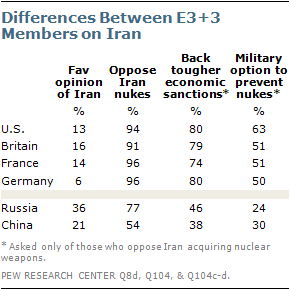 The U.S., Britain, France, Germany, Russia and China – known as the E3+3 – are currently negotiating with Iran in an effort to keep Tehran from crossing a threshold that would enable it to quickly produce a nuclear bomb. But there are differences between these negotiating partners in their opposition to the Iranian nuclear weapons program, in their support for economic sanctions and in their willingness to resort to the use of military force if necessary to blunt Tehran’s nuclear ambitions.
The U.S., Britain, France, Germany, Russia and China – known as the E3+3 – are currently negotiating with Iran in an effort to keep Tehran from crossing a threshold that would enable it to quickly produce a nuclear bomb. But there are differences between these negotiating partners in their opposition to the Iranian nuclear weapons program, in their support for economic sanctions and in their willingness to resort to the use of military force if necessary to blunt Tehran’s nuclear ambitions.
Nine-in-ten people or more among the transatlantic E3+3 partners oppose Iran’s nuclear weapons aspiration. But just over half (54%) of Chinese agree. There are even greater differences among the negotiating partners over economic sanctions. Among those who oppose Tehran’s nuclear armaments program, about eight-in-ten Americans, Germans and British back sanctions, but only 38% of Chinese and 46% of Russians are in agreement.
The military option is even more divisive among those who are against Iran’s nuclear weapons program. A solid majority (63%) of Americans would turn to military force to prevent Iran from going nuclear. Roughly half of Washington’s European allies would support such a move. And there is very little Chinese or Russian support for a military strike.
These are among the findings from a survey by the Pew Research Center’s Global Attitudes Project, conducted March 17 to April 20, 2012.
No To a Nuclear Iran
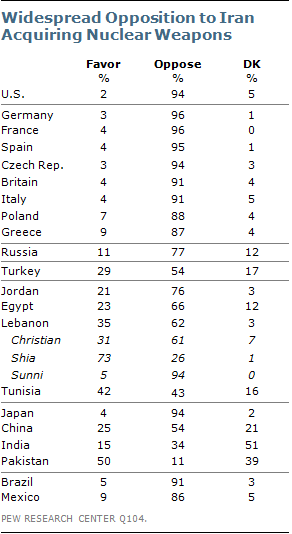 There is almost universal opposition to Iran acquiring nuclear weapons across the 21 nations surveyed by the Pew Research Center’s Global Attitudes Project.
There is almost universal opposition to Iran acquiring nuclear weapons across the 21 nations surveyed by the Pew Research Center’s Global Attitudes Project.
Among the United States and its fellow European negotiating partners, the opposition is overwhelming: 96% of the French and the Germans, 94% of Americans and 91% of the British oppose Tehran’s nuclear ambitions. Other Europeans have similar sentiments. Fully 95% in Spain, 94% in Czech Republic and 91% in Italy do not want Tehran to have an atomic bomb. This opposition is effectively unchanged since the first Pew Global Attitudes survey on this issue in 2006.
Russians and Chinese, whose governments are the other two partners in the E3+3 process, also oppose the Iranian nuclear weapons program, but less strongly. Roughly three-in-four Russians (77%) are against Tehran acquiring nuclear armaments. In China, 54% oppose Tehran’s nuclear weapons ambitions, down 15 points from 2007.
Iran’s regional neighbors generally would rather not see an Iranian nuclear arsenal. But opinions do vary and they are fluid. About three-in-four Jordanians (76%), two-in-three Egyptians (66%) and 54% of Turks oppose Tehran acquiring nuclear weaponry, while Tunisians are divided (42% favor, 43% oppose). Half of Pakistanis back Tehran’s nuclear ambitions, while just 11% oppose them. Nearly four-in-ten Pakistanis (39%) have no opinion.
Lebanon is an interesting sectarian case study. Overall, the Lebanese oppose Iran having nuclear weapons by a 62% to 35% margin. But there is a deep cleavage in opinion among religious groups in the country: 94% of Sunni Muslims are against the Iranian nuclear program, as are 61% of Lebanese Christians. Nearly three-in-four Shia Muslims (73%), however, support it. Iranians are mostly Shia Muslims.
And views within the region are changing. Since 2006, opposition to Iran’s nuclear ambitions is up 34 percentage points in Jordan and 24 points in Egypt. While 54% of Turks still oppose their neighbor Iran having nuclear weapons, that opposition is down 11 points since last year. And opposition in Lebanon is also down seven points since 2006.
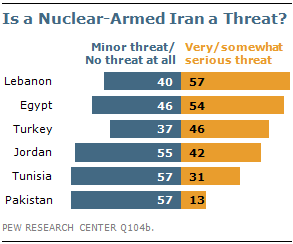 Opposition to Iran’s nuclear program among its neighbors generally tracks public fears of the threat an Iranian atomic bomb might pose to their country. A majority of Lebanese (57%) see a nuclear Iran as threatening. A majority of Tunisians (57%) and Pakistanis (57%) do not.
Opposition to Iran’s nuclear program among its neighbors generally tracks public fears of the threat an Iranian atomic bomb might pose to their country. A majority of Lebanese (57%) see a nuclear Iran as threatening. A majority of Tunisians (57%) and Pakistanis (57%) do not.
The outlier is Jordan. A very strong Jordanian majority opposes Tehran’s nuclear ambitions, but a majority (55%) also say that such an Iranian force would pose no danger to their safety.
Opposition to the Iranian nuclear armaments program is overwhelming in Japan (94%), Brazil (91%) and Mexico (86%).
Divisions Over Tougher Economic Sanctions
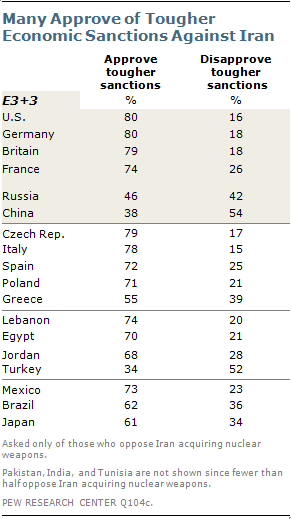 Economic sanctions have been imposed on Iran by the international community in an effort to dissuade Tehran from continuing its efforts to build a nuclear arsenal. Additional EU sanctions are scheduled to be put in place July 1, 2012.
Economic sanctions have been imposed on Iran by the international community in an effort to dissuade Tehran from continuing its efforts to build a nuclear arsenal. Additional EU sanctions are scheduled to be put in place July 1, 2012.
Among those who oppose Iran acquiring nuclear weapons, Americans and citizens of their European negotiating partners in the E3+3 talks with Iran strongly support tougher international economic measures against Tehran to try to stop its atomic weapons program. This includes 80% in the U.S. and Germany, 79% in Britain and 74% in France.
In some of the negotiating partners, there is a bit of a generation gap among those who oppose a nuclear-armed Iran. Sanctions are generally supported by the young. But in Britain, people ages 18-29 are 17 points less likely to back sanctions than people 50 years of age and older. Similarly, in France the young are 14 points less likely than their elders to be supportive. And in the United States they are 13 points less likely.
The Chinese and Russians do not agree with their negotiating counterparts on economic sanctions. Moreover, support for sanctions is eroding in these two pivotal members of the E3+3 talks. Just 46% of Russians who oppose the Iranian nuclear program back new sanctions, down from 67% in 2010. In China, 38% favor more sanctions, a drop of 20 percentage points over the last two years.
Other Europeans are generally supportive of sanctions, including 79% of Czechs who oppose the Iranian program and 78% of Italians. But only 55% of Greeks agree. Some publics whose governments are further removed from the current negotiations with Iran are also somewhat less supportive: the Brazilians (62%) and Japanese (61%).
Iran’s regional neighbors are fairly sympathetic toward sanctions, including 74% of Lebanese who oppose Iran’s acquisition of nuclear weapons, 70% of Egyptians and 68% of Jordanians. The Turks, with a lively cross border trade with Iran, see sanctions in a different light. Roughly half of those who oppose Iran’s program in Turkey (52%) disapprove of tougher economic sanctions against their neighbor.
Divisions Over Military Action
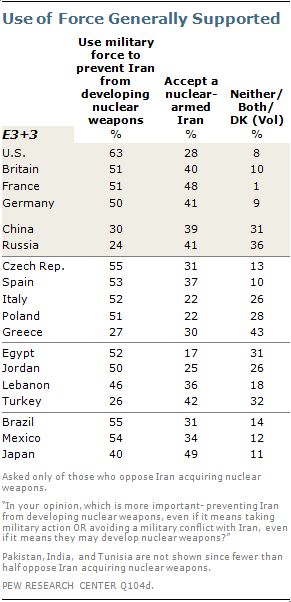 Among those who oppose Iran acquiring nuclear weapons, Americans are the most willing to take military action if necessary to prevent an Iranian nuclear weapons program. The British and Germans lean toward the use of military force, while the French are split. The Russians and the Chinese show no support for a military strike and lean toward accepting a nuclear Iran.
Among those who oppose Iran acquiring nuclear weapons, Americans are the most willing to take military action if necessary to prevent an Iranian nuclear weapons program. The British and Germans lean toward the use of military force, while the French are split. The Russians and the Chinese show no support for a military strike and lean toward accepting a nuclear Iran.
If necessary to keep Tehran from developing nuclear weapons, 63% in the U.S. are willing to go to war. And that proportion has not changed significantly since 2010. Only 28% are ready to accept a nuclear-armed Iran.
Only about half of those who oppose an Iranian nuclear program among America’s European allies in the E3+3 talks agree: 51% in Britain and France and 50% in Germany. This sentiment is unchanged in Britain and Germany, but down eight points in France since 2010. Thus there is a significant 12-13 point transatlantic divide on whether to take military action if the E3+3 talks fail to end the Iranian weapons program. Roughly two-in-five or more of the British, French and Germans could live with a nuclear-armed Iran.
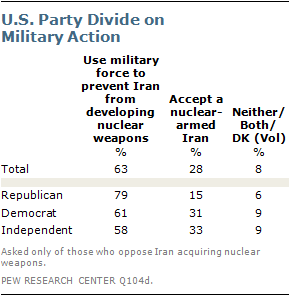 Within the E3+3 countries there are significant political differences on resorting to force. In the United States, among those who oppose Iran acquiring nuclear weapons, Republicans (79%) are more supportive of turning to military force if necessary than are Democrats (61%) or independents (58%).
Within the E3+3 countries there are significant political differences on resorting to force. In the United States, among those who oppose Iran acquiring nuclear weapons, Republicans (79%) are more supportive of turning to military force if necessary than are Democrats (61%) or independents (58%).
In France there is also a left-right split. Only 43% of the French on the left of the political spectrum favor military action to prevent Iran from obtaining nuclear weapons. A majority (56%) could accept a nuclear Iran. French conservatives take exactly the opposite view: 56% back military force. In Britain and Germany there is no significant ideological division on the issue.
 For the most part there is no generation gap among the E3+3 over the use of force, except in Britain. Younger British, ages 18-29, are 19 points more likely to support military action than British 50 years of age and older.
For the most part there is no generation gap among the E3+3 over the use of force, except in Britain. Younger British, ages 18-29, are 19 points more likely to support military action than British 50 years of age and older.
Publics in Russia and China, the other two E3+3 negotiators with Iran, definitely do not back a military solution to the Iranian nuclear challenge. Only 30% of Chinese who oppose Iran’s nuclear ambitions support the use of force. In Russia 24% hold this view, down from 32% in 2010. Roughly four-in-ten Russians (41%) and Chinese (39%) want to avoid war, even if that means Tehran gets the bomb. But 36% of Russians and 31% of the Chinese volunteer that they reject both options or have no opinion.
Sentiment in other parts of Europe is comparable to that among the European E3+3 participants. About half or more of Czechs (55%), Spanish (53%), Italians (52%) and Poles (51%) who oppose an Iranian nuclear program would back a military strike to halt it. The outlier is Greece, which is deeply divided: only 27% support a military solution, 30% would accept a nuclear-armed Iran and 43% reject both options or express no opinion.
By considerable margins, Egyptians and Jordanians who oppose Tehran acquiring nuclear weapons would support military action against Iran. Fully 52% in Egypt and 50% in Jordan back the use of force, only 17% of Egyptians and 25% of Jordanians say they can live with a nuclear Iran. And that sentiment has not changed much in the last two years.
In Lebanon, a plurality (46%) would approve resorting to armed intervention. The Turks, for their part, are very leery of the use of force. Barely a quarter (26%) would agree to military intervention in Iran, while 42% want to avoid a military conflict even if that means the Iranians develop a nuclear weapons capacity.
In other parts of the world, the Brazilians (55%) and the Mexicans (54%) would back the use of force. But only two-in-five Japanese (40%) would agree to do so. Sentiment in Japan seems to be shifting somewhat. In 2010 a majority of Japanese (55%) supported avoiding conflict at all cost. Today only 49% hold that position.
Iran’s Negative International Image
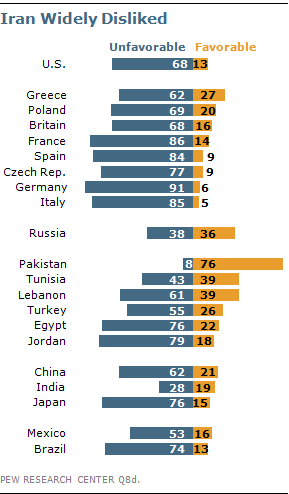 Overall ratings of Iran remain largely negative across much of the world. Solid majorities in the United States and the European Union have an unfavorable opinion of Iran, including more than eight-in-ten people in Germany (91%), France (86%), Italy (85%) and Spain (84%).
Overall ratings of Iran remain largely negative across much of the world. Solid majorities in the United States and the European Union have an unfavorable opinion of Iran, including more than eight-in-ten people in Germany (91%), France (86%), Italy (85%) and Spain (84%).
Negative assessments are also common in E3+3 member China (62%). In Russia, however, views are divided, with 38% expressing a negative and 36% a positive view. Iran’s image has declined slightly in Russia since last year, when 42% had a favorable opinion.
Iran is also unpopular in many predominantly Muslim nations who are its neighbors. Roughly six-in-ten Lebanese (61%) give the Islamic Republic a negative rating, although views are sharply divided among the country’s major religious communities. 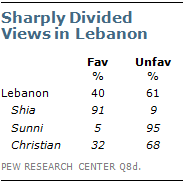 About nine-in-ten Lebanese Shia Muslims (91%) hold a positive view of Iran, compared with just 5% of Sunni Muslims and 32% of Christians.
About nine-in-ten Lebanese Shia Muslims (91%) hold a positive view of Iran, compared with just 5% of Sunni Muslims and 32% of Christians.
In Turkey, where diplomatic tensions with Iran have increased over the last year, 55% of the people have an unfavorable opinion about Iran, while only 26% express a favorable view.
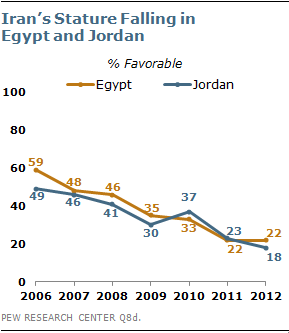 Jordanians (79% unfavorable) and Egyptians (76%) give Iran especially poor marks. Moreover, ratings for Iran have declined precipitously since 2006, when 59% of Egyptians and 49% of Jordanians expressed a positive view.
Jordanians (79% unfavorable) and Egyptians (76%) give Iran especially poor marks. Moreover, ratings for Iran have declined precipitously since 2006, when 59% of Egyptians and 49% of Jordanians expressed a positive view.
There is also a generation gap on this question in some countries in the region. Young people in Tunisia, ages 18-29, are 16 percentage points more likely to have an unfavorable view of Iran than are people 50 years of age and older. In Turkey the generation gap is 14 points, while in Lebanon it is ten points.
Pakistan sees its neighbor quite differently: 76% of Pakistanis give Iran a positive rating. Meanwhile, Tunisians are roughly divided (43% unfavorable, 39% favorable).
Ahmadinejad Unpopular
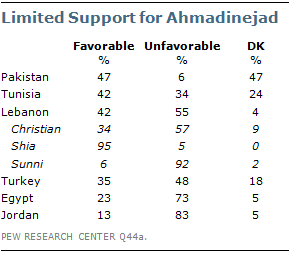 Iranian President Mahmoud Ahmadinejad receives largely negative reviews in most of the predominantly Muslim nations surveyed. However, Pakistan is again a major exception. About half of Pakistanis (47%) express a favorable opinion of Ahmadinejad, while just 6% give him an unfavorable rating (47% do not offer an opinion). Also, a plurality of Tunisians (42%) hold a positive view of the Iranian leader.
Iranian President Mahmoud Ahmadinejad receives largely negative reviews in most of the predominantly Muslim nations surveyed. However, Pakistan is again a major exception. About half of Pakistanis (47%) express a favorable opinion of Ahmadinejad, while just 6% give him an unfavorable rating (47% do not offer an opinion). Also, a plurality of Tunisians (42%) hold a positive view of the Iranian leader.
Once more, Lebanese opinions are split along religious lines, with nearly all Shia (95%) expressing a favorable view of Ahmadinejad and nearly all Sunnis (92%) offering a negative rating. Nearly six-in-ten Christians (57%) also see him in a negative light.
About half of Turks (48%) and large majorities of Jordanians (83%) and Egyptians (73%) have an unfavorable view of the Iranian president.


